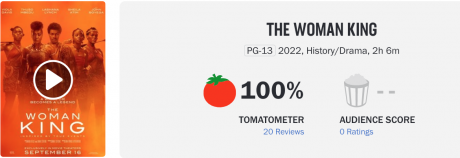I won’t be seeing Gina Prince-Bythewood‘s The Woman King (Sony 9.16) until Tuesday evening. The Toronto Film Festival response has been overwhelmingly positive — a very well contructed, highly engaging action drama, they’re all saying. 100% and 75% scores from Rotten Tomatoes and Metacritic, respectively.
Given the overwhelming tide of positivity, HE salutes World of Reel‘s Jordan Ruimy for having the temerity to swim against the tide. I’ve no opinion if Ruimy’s view is correct or incorrect (ask me late Tuesday night), but his review also points out the historical record about the Kingdom of Dahomey.
The Woman King “tells the story of the Agojie, an all-female troop of warriors who fought for the west African Dahomey kingdom for centuries, violently and effectively taking on men who threatened and underestimated them.” — Benjamin Lee’s Guardian review.
Dahomey Wikipage excerpt: “The Kingdom of Dahomey was an important regional power that had an organized domestic economy built on conquest and slave labor, significant international trade and diplomatic relations with Europeans, a centralized administration, taxation systems, and an organized military. Notable in the kingdom were significant artwork, an all-female military unit called the Dahomey Amazons by European observers, and the elaborate religious practices of Vodun.
“The growth of Dahomey coincided with the growth of the Atlantic slave trade, and it became known to Europeans as a major supplier of slaves. As a highly militaristic kingdom constantly organised for warfare, it captured children, women, and men during wars and raids against neighboring societies, and sold them into the Atlantic slave trade in exchange for European goods such as rifles, gunpowder, fabrics, cowrie shells, tobacco, pipes, and alcohol.”
From Peter Debruge‘s Variety review: “Dana Stevens’ stirring script strategically downplays the Dahomey’s own practice of capturing and enslaving others, which surely would have complicated the more admirable dimensions of this historical — and history-making — drama.”

